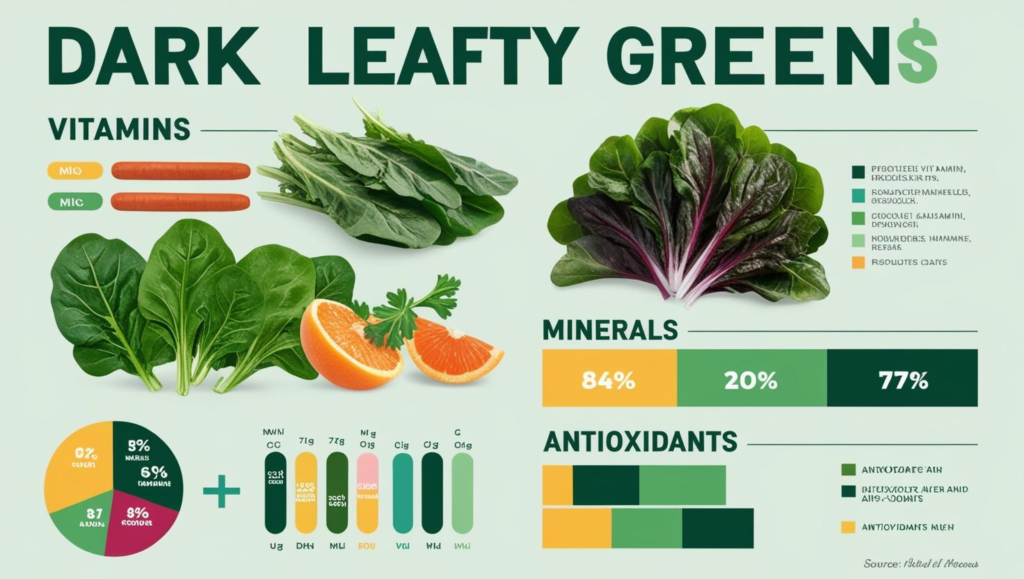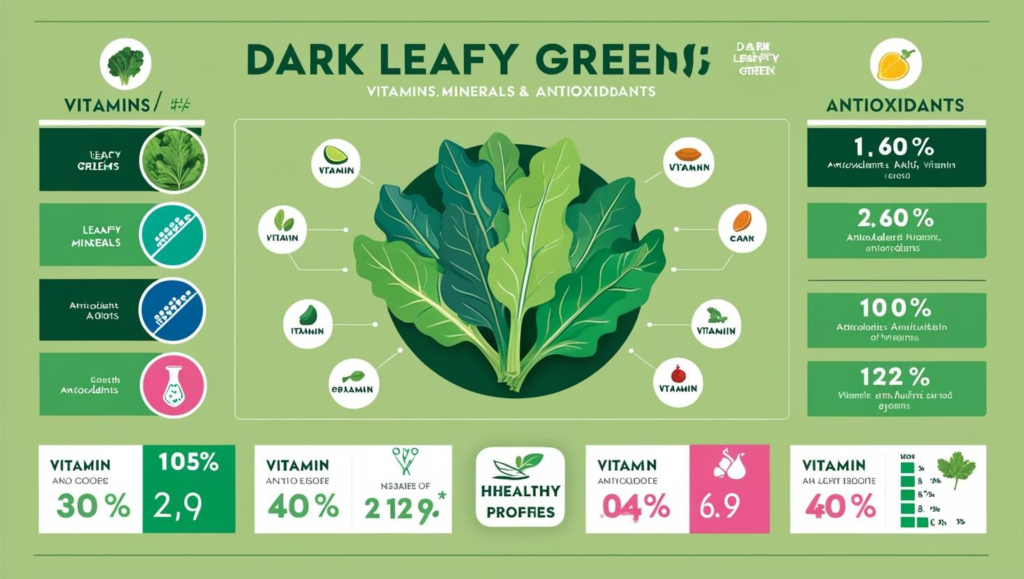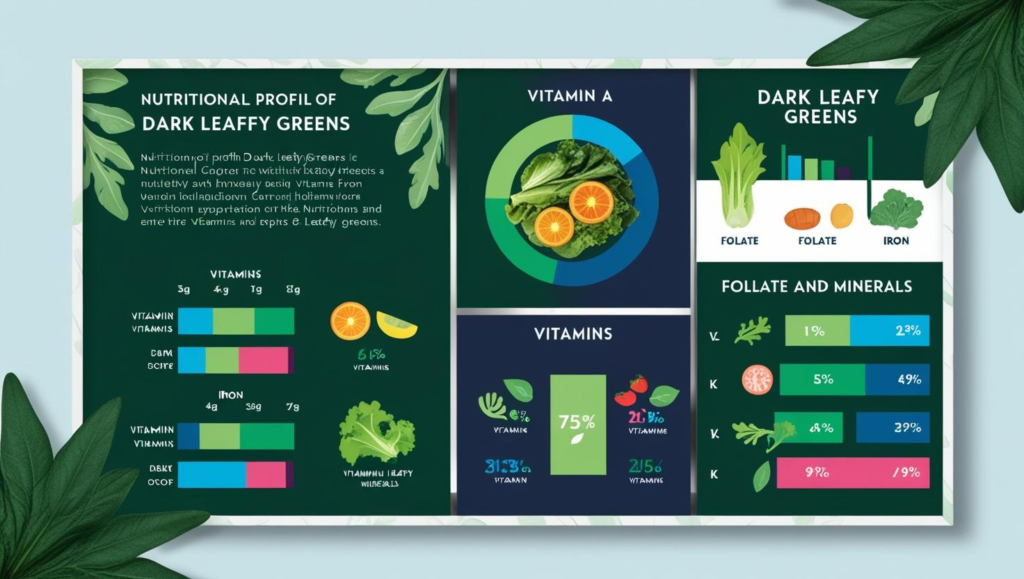Introduction
Dark leafy greens are a powerhouse of nutrition, and their benefits for heart health are particularly noteworthy. These vegetables, including spinach, kale, collard greens, and Swiss chard, are packed with vitamins, minerals, and antioxidants that support cardiovascular function. Incorporating dark leafy greens into your diet can significantly enhance your heart health by lowering blood pressure, reducing cholesterol levels, and improving overall cardiovascular well-being. In this article, we’ll explore how leafy greens contribute to a healthy heart and provide practical tips on how to make them a regular part of your meals. The Benefits of Dark Leafy Greens for Heart Health

Leafy greens are versatile, delicious, and a simple way to naturally boost your heart health. Whether you want to prevent heart disease or improve your cardiovascular condition, these nutrient-rich vegetables are an excellent addition to any diet.
Nutritional Profile of Dark Leafy Greens
Dark leafy greens are rich in essential nutrients that play a crucial role in maintaining heart health. They are an excellent source of vitamins A, C, and K, as well as folate and magnesium. Here’s how these nutrients contribute:
- Vitamin K: Essential for blood clotting, it helps prevent the calcification of arteries, a major risk factor for heart disease.
- Magnesium: Regulates blood pressure and supports proper heart rhythm.
- Folate: Reduces homocysteine levels in the blood, which, when elevated, can increase the risk of heart attacks and strokes.
Additionally, leafy greens are high in dietary fiber, which aids in lowering cholesterol levels by binding to bile acids and removing them from the body. They also contain potent antioxidants like lutein and zeaxanthin, which combat oxidative stress and inflammation—two key contributors to heart disease. The nutritional components of leafy greens make them a vital food group for anyone aiming to improve their heart health naturally.

Benefits of Dark Leafy Greens for Heart Health
The benefits of dark leafy greens for heart health are numerous and backed by scientific research. Below are the key ways they support cardiovascular function:
Lowering Blood Pressure
Leafy greens are rich in potassium, a mineral that helps balance sodium levels in the body, reducing blood pressure. Studies show that increasing potassium intake through foods like spinach and kale can lead to significant blood pressure reductions, particularly in individuals with hypertension. This makes leafy greens a natural ally for those managing high blood pressure.
Reducing Cholesterol Levels
The fiber in leafy greens helps lower LDL (bad) cholesterol by preventing its absorption in the gut. Furthermore, compounds like chlorophyll have been found to block cholesterol absorption, offering additional protection for heart health. Regularly eating leafy greens can help maintain healthy cholesterol levels and reduce the risk of plaque buildup in arteries.
Anti-inflammatory Properties
Chronic inflammation is a major driver of heart disease. Leafy greens contain antioxidants and phytonutrients that reduce inflammation, protecting the heart and blood vessels from damage. By decreasing inflammation, leafy greens help prevent conditions like atherosclerosis, keeping your cardiovascular system functioning optimally.
Improving Blood Vessel Function
Leafy greens are a natural source of nitric oxide, a compound that helps dilate blood vessels, improving blood flow and reducing the risk of atherosclerosis (hardening of the arteries). Better blood vessel function means improved circulation and less strain on the heart, further enhancing heart health.
These benefits demonstrate why leafy greens are essential for heart health. Adding them to your diet can provide a proactive way to support your cardiovascular system and reduce the risk of heart-related issues.
How to Include Dark Leafy Greens in Your Diet

Incorporating leafy greens into your daily meals is easier than you might think. Here are some practical and delicious ways to enjoy them:
- Salads: Use spinach or arugula as a base and add toppings like nuts, seeds, or lean protein for a heart-healthy meal.
- Smoothies: Blend kale or Swiss chard with fruits like bananas and berries for a nutrient-packed drink that supports heart health.
- Stir-fries: Toss chopped leafy greens into stir-fries for added flavor and nutrition.
- Soups: Add collard greens or mustard greens to soups and stews for a warm, heart-healthy dish.
Tips for Buying and Storing Leafy Greens
- Choose fresh, vibrant leaves without wilting or yellowing.
- Store leafy greens in the refrigerator in a perforated bag to maintain crispness.
- Wash them thoroughly before use to remove dirt or pesticides.
These simple strategies make it easy to enjoy leafy greens and support your heart health every day. Whether you’re a beginner or a seasoned cook, there’s a way to fit these greens into your routine.

Frequently Asked Questions about Leafy Greens and Heart Health
Here are some common questions about leafy greens and their role in heart health:
- What are dark leafy greens?
Dark leafy greens are vegetables with dark green leaves, such as spinach, kale, collard greens, Swiss chard, and arugula. They are known for their high nutrient content and benefits for heart health. - How do leafy greens improve heart health?
Leafy greens improve heart health by providing nutrients like potassium, magnesium, and fiber, which help lower blood pressure, reduce cholesterol, and decrease inflammation. - How much leafy greens should I eat for heart health?
Aim for at least 1-2 servings per day. A serving is about one cup of raw leafy greens or half a cup cooked. - Can I get the same benefits from supplements?
While supplements can provide some nutrients, whole foods like leafy greens offer a unique combination of vitamins, minerals, and antioxidants that work together to support heart health more effectively.
These answers highlight leafy greens’ practical and nutritional value for maintaining a healthy heart.
Conclusion
Dark leafy greens are a vital component of a heart-healthy diet. Their rich nutritional profile—including vitamins, minerals, and antioxidants—provides numerous benefits for cardiovascular function. From lowering blood pressure and cholesterol to reducing inflammation and improving blood vessel health, leafy greens are a powerful ally in the fight against heart disease. By incorporating them into your meals regularly, you can take a proactive step toward better heart health.
Next time you’re planning your meals, consider adding a generous serving of leafy greens. Whether it’s a spinach salad, a kale smoothie, or a bowl of collard greens, your heart will thank you for the boost. Start small, experiment with recipes, and enjoy the long-term rewards of this simple dietary change.



Pingback: Legumes for Diabetes Management: - mysproutapp.com